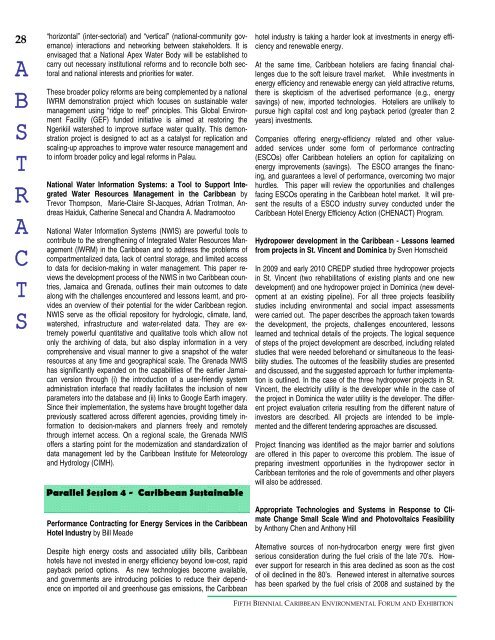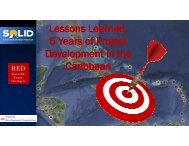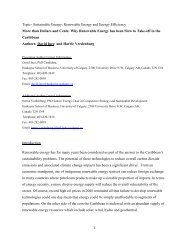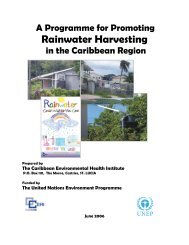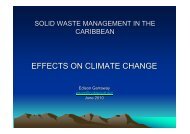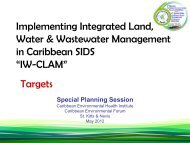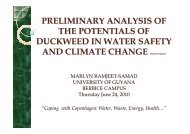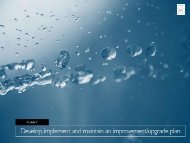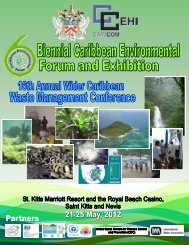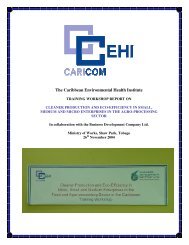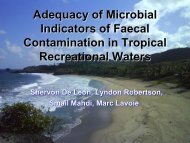conference magazine - Caribbean Environmental Health Institute
conference magazine - Caribbean Environmental Health Institute
conference magazine - Caribbean Environmental Health Institute
You also want an ePaper? Increase the reach of your titles
YUMPU automatically turns print PDFs into web optimized ePapers that Google loves.
28<br />
A<br />
B<br />
S<br />
T<br />
R<br />
A<br />
C<br />
T<br />
S<br />
“horizontal” (inter-sectorial) and “vertical” (national-community governance)<br />
interactions and networking between stakeholders. It is<br />
envisaged that a National Apex Water Body will be established to<br />
carry out necessary institutional reforms and to reconcile both sectoral<br />
and national interests and priorities for water.<br />
These broader policy reforms are being complemented by a national<br />
IWRM demonstration project which focuses on sustainable water<br />
management using “ridge to reef” principles. This Global Environment<br />
Facility (GEF) funded initiative is aimed at restoring the<br />
Ngerikiil watershed to improve surface water quality. This demonstration<br />
project is designed to act as a catalyst for replication and<br />
scaling-up approaches to improve water resource management and<br />
to inform broader policy and legal reforms in Palau.<br />
National Water Information Systems: a Tool to Support Integrated<br />
Water Resources Management in the <strong>Caribbean</strong> by<br />
Trevor Thompson, Marie-Claire St-Jacques, Adrian Trotman, Andreas<br />
Haiduk, Catherine Senecal and Chandra A. Madramootoo<br />
National Water Information Systems (NWIS) are powerful tools to<br />
contribute to the strengthening of Integrated Water Resources Management<br />
(IWRM) in the <strong>Caribbean</strong> and to address the problems of<br />
compartmentalized data, lack of central storage, and limited access<br />
to data for decision-making in water management. This paper reviews<br />
the development process of the NWIS in two <strong>Caribbean</strong> countries,<br />
Jamaica and Grenada, outlines their main outcomes to date<br />
along with the challenges encountered and lessons learnt, and provides<br />
an overview of their potential for the wider <strong>Caribbean</strong> region.<br />
NWIS serve as the official repository for hydrologic, climate, land,<br />
watershed, infrastructure and water-related data. They are extremely<br />
powerful quantitative and qualitative tools which allow not<br />
only the archiving of data, but also display information in a very<br />
comprehensive and visual manner to give a snapshot of the water<br />
resources at any time and geographical scale. The Grenada NWIS<br />
has significantly expanded on the capabilities of the earlier Jamaican<br />
version through (i) the introduction of a user-friendly system<br />
administration interface that readily facilitates the inclusion of new<br />
parameters into the database and (ii) links to Google Earth imagery.<br />
Since their implementation, the systems have brought together data<br />
previously scattered across different agencies, providing timely information<br />
to decision-makers and planners freely and remotely<br />
through internet access. On a regional scale, the Grenada NWIS<br />
offers a starting point for the modernization and standardization of<br />
data management led by the <strong>Caribbean</strong> <strong>Institute</strong> for Meteorology<br />
and Hydrology (CIMH).<br />
Parallel Session 4 - <strong>Caribbean</strong> Sustainable<br />
Performance Contracting for Energy Services in the <strong>Caribbean</strong><br />
Hotel Industry by Bill Meade<br />
Despite high energy costs and associated utility bills, <strong>Caribbean</strong><br />
hotels have not invested in energy efficiency beyond low-cost, rapid<br />
payback period options. As new technologies become available,<br />
and governments are introducing policies to reduce their dependence<br />
on imported oil and greenhouse gas emissions, the <strong>Caribbean</strong><br />
hotel industry is taking a harder look at investments in energy efficiency<br />
and renewable energy.<br />
At the same time, <strong>Caribbean</strong> hoteliers are facing financial challenges<br />
due to the soft leisure travel market. While investments in<br />
energy efficiency and renewable energy can yield attractive returns,<br />
there is skepticism of the advertised performance (e.g., energy<br />
savings) of new, imported technologies. Hoteliers are unlikely to<br />
pursue high capital cost and long payback period (greater than 2<br />
years) investments.<br />
Companies offering energy-efficiency related and other valueadded<br />
services under some form of performance contracting<br />
(ESCOs) offer <strong>Caribbean</strong> hoteliers an option for capitalizing on<br />
energy improvements (savings). The ESCO arranges the financing,<br />
and guarantees a level of performance, overcoming two major<br />
hurdles. This paper will review the opportunities and challenges<br />
facing ESCOs operating in the <strong>Caribbean</strong> hotel market. It will present<br />
the results of a ESCO industry survey conducted under the<br />
<strong>Caribbean</strong> Hotel Energy Efficiency Action (CHENACT) Program.<br />
Hydropower development in the <strong>Caribbean</strong> - Lessons learned<br />
from projects in St. Vincent and Dominica by Sven Homscheid<br />
In 2009 and early 2010 CREDP studied three hydropower projects<br />
in St. Vincent (two rehabilitations of existing plants and one new<br />
development) and one hydropower project in Dominica (new development<br />
at an existing pipeline). For all three projects feasibility<br />
studies including environmental and social impact assessments<br />
were carried out. The paper describes the approach taken towards<br />
the development, the projects, challenges encountered, lessons<br />
learned and technical details of the projects. The logical sequence<br />
of steps of the project development are described, including related<br />
studies that were needed beforehand or simultaneous to the feasibility<br />
studies. The outcomes of the feasibility studies are presented<br />
and discussed, and the suggested approach for further implementation<br />
is outlined. In the case of the three hydropower projects in St.<br />
Vincent, the electricity utility is the developer while in the case of<br />
the project in Dominica the water utility is the developer. The different<br />
project evaluation criteria resulting from the different nature of<br />
investors are described. All projects are intended to be implemented<br />
and the different tendering approaches are discussed.<br />
Project financing was identified as the major barrier and solutions<br />
are offered in this paper to overcome this problem. The issue of<br />
preparing investment opportunities in the hydropower sector in<br />
<strong>Caribbean</strong> territories and the role of governments and other players<br />
will also be addressed.<br />
Appropriate Technologies and Systems in Response to Climate<br />
Change Small Scale Wind and Photovoltaics Feasibility<br />
by Anthony Chen and Anthony Hill<br />
Alternative sources of non-hydrocarbon energy were first given<br />
serious consideration during the fuel crisis of the late 70’s. However<br />
support for research in this area declined as soon as the cost<br />
of oil declined in the 80’s. Renewed interest in alternative sources<br />
has been sparked by the fuel crisis of 2008 and sustained by the<br />
FIFTH BIENNIAL CARIBBEAN ENVIRONMENTAL FORUM AND EXHIBITION


